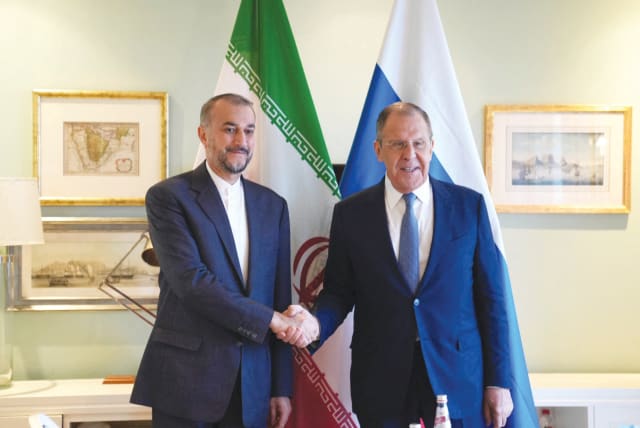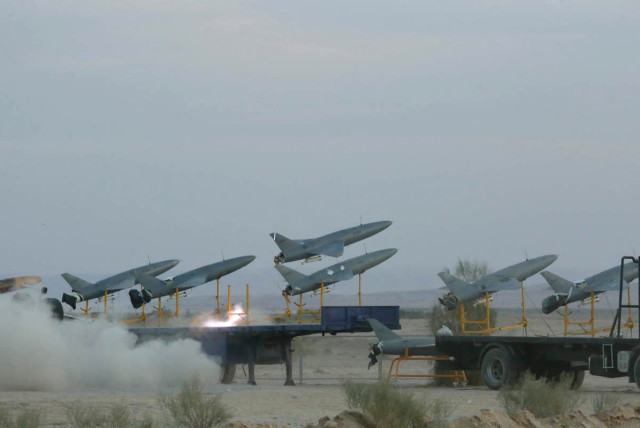After attacking Israel, Iran counts on Russia's support moving forward

After its drone attack against Israel, Iran seeks to continue building its partnership with Russia, which has slammed the UN Security Council's emergency meeting after the attack.
Iran is hoping for Russian support in the wake of its massive attack on Israel. The Iranian Foreign Ministry praised Russian Foreign Minister Sergei Lavrov on Monday and noted a phone call between Lavrov and his Iranian counterpart, in which Russia said it would defend Iran at the UN Security Council.
According to pro-Iran Al-Mayadeen media, Tehran views Russia’s comments positively. The Russians, according to the report, said the Iranian attack was coupled with restraint, though this sentiment is questionable, as the attack included 350 missiles and drones.
However, both Russia and Iran are allies of the Syrian regime. Iran claimed its attack was in response to an airstrike in Damascus which Tehran has blamed on Israel. “Russia did not doubt that Iran would respond to the Israeli attack on its consulate in Damascus,” the report noted.
Now, Iran has threatened more attacks, claiming “Iran’s response will be stronger and more severe if the Zionist entity carries out new action against it,” a response that is designed to create a new deterrence against Israel to try to prevent more Israeli actions.
Iran wants to rewrite the region’s rules and equation and make it so that Iran can attack Israel directly in the future, and not suffer any kind of direct response.
Iran says openly that its attack with 350 drones and missiles was “limited and aimed at deterrence.” In the past, Israel used to try to deter Iran; now it is Iran saying it is deterring Israel, and it wants Moscow’s support in this deterrence.
Iran backs Hamas, and Russia has not condemned the October 7 attack, illustrating how Iran is seeking to bring Russia closer to Tehran’s regional views.
Like Russia, Iran tries to wrap its military attacks in legal terms, claiming that its “response to the Zionist entity was a legal step that falls under the Charter of the United Nations and within the frameworks of international law.” Russia also often uses international law and legal claims to mask its operations, including the invasion of Ukraine. As such,
Iran and Russia are increasingly working in concert on the global stage.
“Iran does not want war, but if it is exposed to an attack, its response will be decisive,” another official of Iran’s regime said, according to the report.
Moscow reportedly concerned about Mideast situation
According to Russia’s state TASS media, Moscow is concerned about the situation in the Middle East, Presidential Spokesman Dmitry Peskov told reporters. “We call on all countries in the region to exercise restraint. Further escalation is in no one’s interests. Therefore, of course, we are in favor of seeing all disagreements settled only politically and diplomatically,” the Kremlin spokesman said. TASS reported Iranian claims that its missiles and drones targeted “military facilities.”
Russia also slammed the UN Security Council’s emergency meeting on Iran’s attack. Russian Permanent Representative to the UN Vasily Nebenzya said, “You know very well that an attack on a diplomatic mission is a casus belli under international law. And if Western missions were attacked, you would not hesitate to retaliate and prove your case in this room. Because for you, everything that concerns Western missions and Western citizens is sacred and must be protected,” according to a report at TASS. “Today, the Security Council is witnessing such a parade of Western hypocrisy and double standards that it is even somewhat uncomfortable to watch,” the diplomat said.
Moscow’s comments are important because it shows how Russia is seeking to shield Iran from criticism. Russia sees the current tensions in the Middle East as part of its wider struggle against the West. It has hoped to use the Hamas massacre on October 7, and now the recent Iranian attack, to distract from its war in Ukraine and also to leverage these issues to Moscow’s benefit.
Jerusalem Post Store
`; document.getElementById("linkPremium").innerHTML = cont; var divWithLink = document.getElementById("premium-link"); if (divWithLink !== null && divWithLink !== 'undefined') { divWithLink.style.border = "solid 1px #cb0f3e"; divWithLink.style.textAlign = "center"; divWithLink.style.marginBottom = "15px"; divWithLink.style.marginTop = "15px"; divWithLink.style.width = "100%"; divWithLink.style.backgroundColor = "#122952"; divWithLink.style.color = "#ffffff"; divWithLink.style.lineHeight = "1.5"; } } (function (v, i) { });

